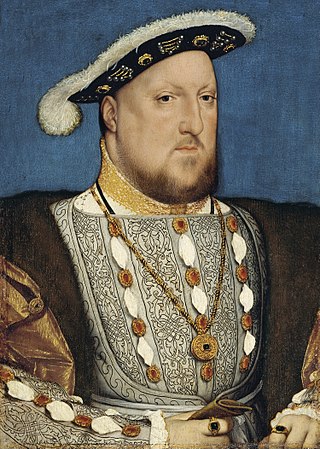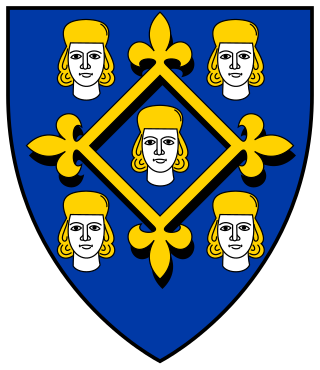Related Research Articles

Kett's Rebellion was a revolt in Norfolk, England during the reign of Edward VI, largely in response to the enclosure of land. It began at Wymondham on 8 July 1549 with a group of rebels destroying fences that had been put up by wealthy landowners. One of their targets was yeoman Robert Kett who, instead of resisting the rebels, agreed to their demands and offered to lead them. Kett and his forces, joined by recruits from Norwich and the surrounding countryside and numbering some 16,000, set up camp on Mousehold Heath to the north-east of the city on 12 July. The rebels stormed Norwich on 29 July and took the city. On 1 August the rebels defeated a Royal Army led by the Marquess of Northampton who had been sent by the government to suppress the uprising. Kett's rebellion ended on 27 August when the rebels were defeated by an army under the leadership of the Earl of Warwick at the Battle of Dussindale. Kett was captured, held in the Tower of London, tried for treason, and hanged from the walls of Norwich Castle on 7 December 1549.

Wulfstan was Bishop of Worcester from 1062 to 1095. He was the last surviving pre-Conquest bishop. Wulfstan is a saint in the Western Christian churches.

The Prayer Book Rebellion or Western Rising was a popular revolt in Cornwall and Devon in 1549. In that year, the first Book of Common Prayer, presenting the theology of the English Reformation, was introduced. The change was widely unpopular, particularly in areas where firm Catholic religious loyalty still existed, such as Lancashire. Along with poor economic conditions, the enforcement of the English language led to an explosion of anger in Cornwall and Devon, initiating an uprising. In response, Edward Seymour, 1st Duke of Somerset sent John Russell to suppress the revolt, with the rebels being defeated and its leaders executed two months after the beginning of hostilities.
William de Warenne, 1st Earl of Surrey, Lord of Lewes, Seigneur de Varennes, was a Norman nobleman created Earl of Surrey under William II Rufus. He is among the few known from documents to have fought under William the Conqueror at the Battle of Hastings in 1066. At the time of the Domesday Book in 1086, he held extensive lands in 13 counties, including the Rape of Lewes, a tract now divided between the ceremonial counties of East Sussex and West Sussex.

Richard Cox was an English clergyman, who was Dean of Westminster and Bishop of Ely.

The Bishop of Norwich is the ordinary of the Church of England Diocese of Norwich in the Province of Canterbury. The diocese covers most of the county of Norfolk and part of Suffolk. The bishop of Norwich is Graham Usher.
John Ponet, sometimes spelled John Poynet, was an English Protestant churchman and controversial writer, the bishop of Winchester and Marian exile. He is now best known as a resistance theorist who made a sustained attack on the divine right of kings.
Nicholas Farnham was a medieval Bishop of Durham.
John Salmon was a medieval Bishop of Norwich.
Events from the 1540s in England.

The English Reformation took place in 16th-century England when the Church of England broke away from the authority of the pope and the Catholic Church. These events were part of the wider European Reformation, a religious and political movement that affected the practice of Christianity in Western and Central Europe.
Richard Nykke became bishop of Norwich under Pope Alexander VI in 1515. Norwich at this time was the second-largest conurbation in England, after London.
John Salisbury, O.S.B. was a Welsh clergyman who held high office in the pre- and post-Reformation church in England.
William Kingsmill alias William Basyng (?–1549) was Prior of St. Swithun's Priory, Winchester until the Dissolution of the Monastery in 1539; it was a Benedictine monastic house and its shrine to the saint popularly associated with determining the entire period of pre-harvest weather was a place of pilgrimage. He was appointed as the first Dean of Winchester Cathedral at the foundation of the new chapter in 1541.

Henry Man was an English clergyman who served as the Bishop of Sodor and Man in the 16th century.

Osbert Parsley was an English Renaissance composer and chorister. Few details of his life are known, but he evidently married in 1558, and lived for a period in the parish of St Saviour's Church, Norwich. A boy chorister at Norwich Cathedral, Parsley worked there throughout his musical career. He was first mentioned as a lay clerk, was appointed a "singing man" in c. 1534, and was probably the cathedral's unofficial organist for half a century. His career spanned the reigns of Henry VIII and all three of his children. After the Reformation of 1534, the lives of English church musicians changed according to the official policy of each monarch.
Roger Tonge otherwise Roger Tong or Tongue was an English clergyman who served as a chaplain to Edward VI and was later appointed dean of Winchester Cathedral in 1549.
Charles Barclay of Bury Hill, Surrey, was a British brewer and landowner, who also served as a Tory Member of Parliament for the constituencies of Southwark (1815–1818), Dundalk (1826–1830), and West Surrey (1835–1837). Closely related to both the Barclay and Gurney banking dynasties, he came from a prominent Quaker family and was cousin of social reformer Elizabeth Fry.
References
- ↑ Ralph Houlbrooke, 'Refoundation and Reformation 1538-1623' in ed. by Ian Atherton, Eric Fernie, Christopher Harper-Bill and Hassell Smith, Norwich Cathedral: Church, City and Diocese, 1096-1996 (London: The Hambledon Press, 1996), p. 526
- ↑ Andy Wood, The 1549 rebellions and the making of early modern England (Cambridge: Cambridge University Press, 2007), p. 63